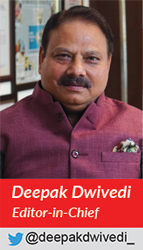 The relevance and efficacy of the United Nations is being questioned once again as the crisis in the Middle East crosses third week and the war in Ukraine rages on for over 600 days. Human lives are lost, women and children suffer and billions of dollars end up in smoke.
The relevance and efficacy of the United Nations is being questioned once again as the crisis in the Middle East crosses third week and the war in Ukraine rages on for over 600 days. Human lives are lost, women and children suffer and billions of dollars end up in smoke.
Following Secretary-General António Guterres’ briefing on October 24, Gilad Erdan, Permanent Representative of Israel to the UN, posted on X that, in effect, the former’s speech had sought to justify Hamas’ brutal assault. He demanded Guterres’ resignation, adding that Israel would now withhold visas to UN officials. Israel’s Foreign Minister Eli Cohen, accusing the UN chief of justifying terrorism, cancelled a scheduled meeting with him.
Though Guterres said he was “shocked by the misrepresentation by some of my statement”, he acknowledged that he had indeed spoken of Palestinian grievances. He stressed he had also said in the Council that “the grievances of the Palestinian people cannot justify the appalling attacks by Hamas.”
The core issue here is that the UN continues to voice concerns within its four walls and keep failing to follow its charter on ground. The UN Charter is an instrument of international law and UN member states are bound by it. It “codifies the major principles of international relations, from sovereign equality of States to the prohibition of the use of force in international relations”. Yet, world powers play a zero-sum game.
India’s Prime Minister Narendra Modi has raised this concern on several occasions. He has pointed out that since the time the UN was established with just 51 founding members, till today, when the number is around 200, the permanent members in the UNSC remain the same. Incidentally, India ensured the world heard the voice of the Global South in the year of its G20 presidency. It was primarily the efforts of PM Modi that the African Union was included in the grouping.
This was mentioned by External Affairs Minister S Jaishankar in the National Statement at the General Debate of the 78th UNGA on September 26. Holding no punches, he stated: “The days when a few nations set the agenda and expected others to fall in line are over.”
Given the divisions within, the UNSC failed to adopt a resolution on the Gaza situation. On October 25, China and Russia vetoed a draft resolution sponsored by the US, while a second Russian-backed resolution failed to secure sufficient votes “deepening the Security Council’s deadlock over any unified response to address the crisis in Gaza and Israel”, said a UN release.
While Russia and China vetoed a US-drafted resolution that called for “humanitarian pauses” and Israel’s right to defend itself, another draft resolution sponsored by Russia failed to get enough votes. If the second resolution had got the approval, the US would have vetoed it. A similar situation had existed over the war in Ukraine when Russia vetoed a resolution against it sponsored by 81 of the UN’s 193 member-states. Commenting on this, the United States Institute of Peace had asked: “The UN Security Council Was Designed for Deadlock – Can it Change?”
Hear ye the voices of the world! It’s time to reform, perform, or perish.
















